外研版高中英语必修三module3教案
外研版必修三英语M3第三单元教案
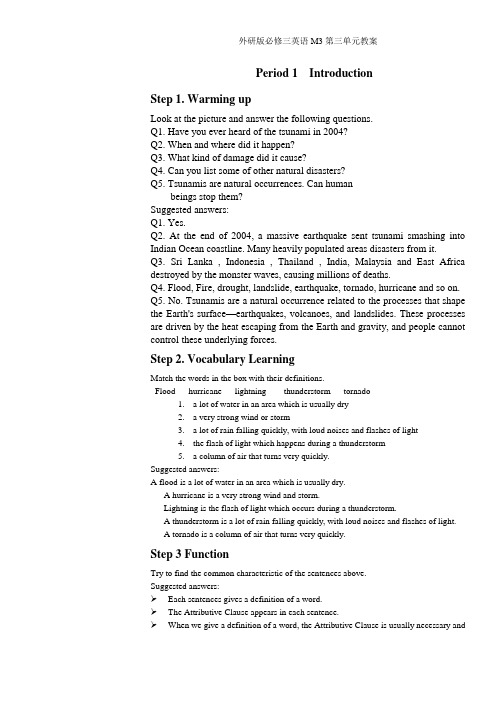
Period 1 IntroductionStep 1. Warming upLook at the picture and answer the following questions.Q1. Have you ever heard of the tsunami in 2004?Q2. When and where did it happen?Q3. What kind of damage did it cause?Q4. Can you list some of other natural disasters?Q5. Tsunamis are natural occurrences. Can humanbeings stop them?Suggested answers:Q1. Yes.Q2. At the end of 2004, a massive earthquake sent tsunami smashing into Indian Ocean coastline. Many heavily populated areas disasters from it.Q3. Sri Lanka , Indonesia , Thailand , India, Malaysia and East Africa destroyed by the monster waves, causing millions of deaths.Q4. Flood, Fire, drought, landslide, earthquake, tornado, hurricane and so on. Q5. No. Tsunamis are a natural occurrence related to the processes that shape the Earth's surface—earthquakes, volcanoes, and landslides. These processes are driven by the heat escaping from the Earth and gravity, and people cannot control these underlying forces.Step 2. Vocabulary LearningMatch the words in the box with their definitions.Flood hurricane lightning thunderstorm tornado1. a lot of water in an area which is usually dry2. a very strong wind or storm3. a lot of rain falling quickly, with loud noises and flashes of light4.the flash of light which happens during a thunderstorm5. a column of air that turns very quickly.Suggested answers:A flood is a lot of water in an area which is usually dry.A hurricane is a very strong wind and storm.Lightning is the flash of light which occurs during a thunderstorm.A thunderstorm is a lot of rain falling quickly, with loud noises and flashes of light.A tornado is a column of air that turns very quickly.Step 3 FunctionTry to find the common characteristic of the sentences above.Suggested answers:➢Each sentences gives a definition of a word.➢The Attributive Clause appears in each sentence.➢When we give a definition of a word, the Attributive Clause is usually necessary andhopeful. We’d better learn to use the structure “A is B that/which”Step 4 PracticeGive definitions of the words following the pattern “A is B that/which”.An earthquake a volcanic eruption a plane crashSuggested answers:1.An earthquake happens when the earth shakes because of movementunderground.2. A volcanic eruption is that lava and ash coming out of a volcano.3. A plane crash is that a plane stopping flying and crashing into the earth. Step 5 Discussions4.Which kind of these natural disasters have ever experienced? Can youdescribe it?5.Have you ever read a news story about one of the events? Can you describeit?6.Do you know anything about the events? For example, what causes them? Homework:1.Surf the Internet in order to have a better understanding of natural disasters.2.Preview the passage in Reading and Vocabulary.Blackboard design:Period 2 Reading and VocabularyStep 1. Leading-inMatch up the photos with the descriptions in Activity 1 on page 2.Step 2. While ReadingI. Fast readingRead the passage quickly and answer the question:Which countries do the four cities mentioned in the passage belong to? Paris belongs to ________.Barcelona belongs to ________.Florence belongs to ________.Athens belongs to _________.II. Intensive reading1.Read the passage carefully and finish answer the questions.(1)Which of the cities are capital cities?(2)Which one is situated on the coast?(3)Which is famous for its places to eat?(4). Which ones are or were important cities for writers and artists?(5) Which was the world’s greatest city a long time ago?2. Read the passage carefully and finish Activity 4.(1)The Eiffel Tower is a tall building in France.(2)There are a lot of restaurants and cafes in Paris.(3)Barcelona is the capital of Spain.(4)The Church of the Sagrada Familia was built in 1926.(5)The artistic movement called the Renaissance began in Florence.(6)The Uffizi Palace is a famous hotel in Florence.(7)A long time ago, Athens was the world’s most powerful city.(8) There were a lot of good writers in ancient Athens.Suggested answers:TTFFTFTT3.Match the words in the box with their definitions.(1)someone who designs buildings_____________(2)to be in a certain place._____________(3)something that is easy to recognize, such as a building_____________(4)someone who produces novels or poems_____________(5)a large building where people can see famous pieces of art_____________(6)the art of making things out of stone and wood,etc_____________ancient architect gallery landmark locate sculpture writer (7)of a time long ago_____________III.Post reading-Discussion1 What did you know about these cities before you read the text?2 What new information did you learn?3 Which of them would you most like to visit?Step IV SummaryToday we have learnt.......Step V HomeworkCollect more information on Internet about one of the cities from the Great European cities.Examples:1 How many people live there?2 What kind of sports do they like?3 What’s their favorite food?4 What about the climate?5 What’re the geographical features?Period 3 Language ExplanationsStep 1【词条1】occur【课文原句】Almost all of them occur in the US, in the area from Texas in the southeast to South Dakota in the north. (Page23)【点拨】occur此处意为“发生”,不及物动词,没有被动语态。
英语必修ⅲ外研版module3period2教案
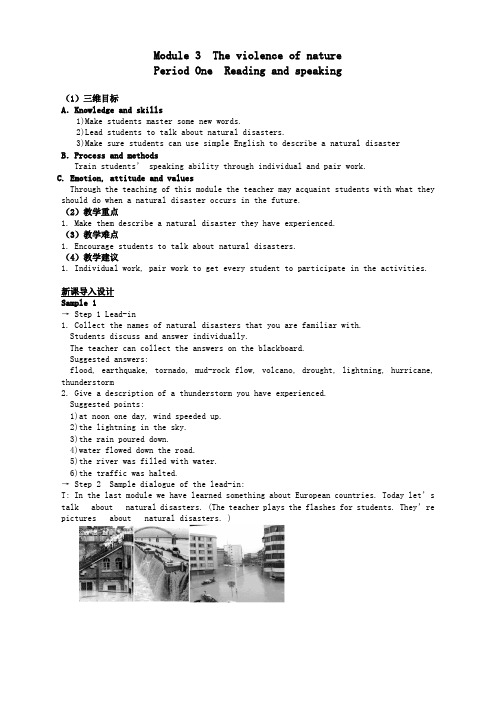
Module 3 The violence of naturePeriod One Reading and speaking(1)三维目标A.Knowledge and skills1)Make students master some new words.2)Lead students to talk about natural disasters.3)Make sure students can use simple English to describe a natural disaster B.Process and methodsTrain students’ speaking ability through individual and pair work.C. Emotion, attitude and valuesThrough the teaching of this module the teacher may acquaint students with what they should do when a natural disaster occurs in the future.(2)教学重点1. Make them describe a natural disaster they have experienced.(3)教学难点1. Encourage students to talk about natural disasters.(4)教学建议1. Individual work, pair work to get every student to participate in the activities.新课导入设计Sample 1→ Step 1 Lead-in1. Collect the names of natural disasters that you are familiar with.Students discuss and answer individually.The teacher can collect the answers on the blackboard.Suggested answers:flood, earthquake, tornado, mud-rock flow, volcano, drought, lightning, hurricane, thunderstorm2. Give a description of a thunderstorm you have experienced.Suggested points:1)at noon one day, wind speeded up.2)the lightning in the sky.3)the rain poured down.4)water flowed down the road.5)the river was filled with water.6)the traffic was halted.→ Step 2 Sample dialogue of the lead-in:T: In the last module we have learned something about European countries. Today let’s talk about natural disasters. (The teacher plays the flashes for students. They’re pictures about natural disasters. )T: They are natural phenomena. Are they terrible?S: Yes, very.T: What can you see?S: We can see the village is in the water. The streets are swallowed by water. People travel by boats.S: We can see the rail is broken. The wind is circling above the road.T: Have you ever experienced them?S: I have experienced a thunderstorm, but not that serious.T: Then do you know anyone who experienced one?S: Yes. I learned from my parents that in 1998 the same thing happened in the south of China.T: What do we usually call it?S: I guess it is a flood.T: You’re quite right. Can you think of some other natural disasters?S: Tornado.S: Earthquake.S: Hurricane.S: . . .T: Well done.→ Step 3 Activity 11)Look at the words in the box together. Students read after the teacher twice.flood hurricane lightning thunderstorm tornado2)Try to match the above words with the following definitions with your partner.Matching the words with the definitions.1. a lot of water in an area which is usually dry_____________2. a very strong wind or storm_____________3. a lot of rain falling quickly, with loud noises and flashes of light _____________4. the flash of light which happens during a thunderstorm _____________5. a column of air that turns very quickly_____________Suggested answers:1.flood2. hurricane3. thunderstorm4. lightning5. tornadoSample 2→ Step 1 Discussion(for higher students)T: Just now we saw scenes of a terrible disaster—flood. Now let’s watch more.(Play the media for students. )While watching please think of the following questions:1. Can you describe a certain natural disaster?2. What is the cause of a certain natural disaster?3. What is the effect of a certain natural disaster?T: Here I will divide you into four groups. Each group chooses a natural disaster. You may first discuss with your partners and then write down the results of your discussion.After that a representative may be chosen to present the results of the discussion.(You can name each team and score them according to their performances so as to activate them to participate in the game. )Five minutes later.T: Any volunteer?S: Let me try. Just as we can see, when a hurricane occurs, violent winds cause huge waves, heavy rain and floods. It can cause great losses to the local people there: trees are pulled out; houses are torn down; people can not stand steadily; many people lose their homes and even die.T: Then do you know the causes of such a phenomenon?S: Once I watched the news about the Hurricane Katrina. Most scientists agree that some human activities play some parts in the disasters. The global warming is the cause of hurricanes, we think.T: Wonderful job!→ Step 2The text is about some natural disasters such as tornados and hurricanes. Read the passage on Page 23 carefully and underline the new words in the text. At the same time answer the following questions:(Show the following on the screen. )1. How strong are tornado winds?2. What can happen to furniture when a house is destroyed by a tornado?3. How many tornados are there in the US every year?4. How many people died in the worst tornado of all time?5. What happens at sea during a hurricane?6. When was the worst hurricane of all time?7. Was the actor Charles Coghlan killed in it?8. What happened to him after the hurricane?Suggested answers:1. More than 400 km/h.2. It stays where it was.3. About 800.4. More than 700.5. It was huge waves.6. 8th September, 1900.7. No, he wasn’t.8. His coffin was dropped in the sea by a hurricane and carried to Canada by the Gulf Stream. → Step 3Find the words and expressions in the passage and match them with the definitions. Read the passage again to find the words and expressions.(Check the new words they have found and write them on the blackboard. )bury disaster feathers fur occur tropical(Show the following on the screen. )Match the above words with their definitions.1. you can see this on an animal_____________2. describing the hottest parts of the earth, north and south of the equator ____________3. a terrible event_____________4. you can see these on a bird_____________5. to place in the ground or tomb_____________6. to happen_____________Suggested answers:1. fur2. tropical3. disaster4. feathers5. bury6. occur→ Step 4 Multiple Choices(for higher students)After reading the passage, choose the correct one.(Show the following on the screen. )1. Which of the following descriptions about tornado is not correct?A. It is a kind of rotating column of air.B. It is usually caused from a thunderstorm.C. It can reach a speed up to more than 400 kilometres per hour.D. It can cause much damage to people, including deaths and injuries.2. How much damage did the worst tornado cause to the US?A. The tornado had winds of more than 400 kilometres per hour.B. The fur of the back of many cats and the feathers of many chickens had been taken off.C. It caused about 80 deaths and 1500 injuries.D. More than 700 people lost their lives and 2700 had been injured.3. What are the similarities between the tornado and the hurricane?A. They both occur together with strong wind.B. America is the country affected often by both of them.C. They both can cause a lot of damage to people and the buildings.D. All above.4. Where was Charles Coghlan born in deed?A. In Ireland.B. In Canada.C. In New York.D. In Galveston.5. What are the causes of these natural disasters?A. The different atmospheric pressure between two areas.B. The changeable weather in these areas.C. The destruction of the nature by human beings.D. Not mentioned in the passage.Suggested answers:1~5 BDDAD。
外研版高中英语必修3Module3_Writing_名师教学设计(一)
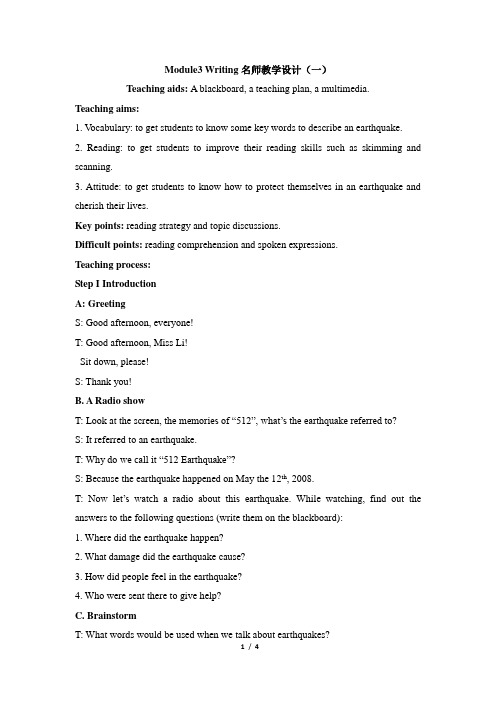
Module3 Writing名师教学设计(一)Teaching aids: A blackboard, a teaching plan, a multimedia.Teaching aims:1. V ocabulary: to get students to know some key words to describe an earthquake.2. Reading: to get students to improve their reading skills such as skimming and scanning.3. Attitude: to get students to know how to protect themselves in an earthquake and cherish their lives.Key points: reading strategy and topic discussions.Difficult points: reading comprehension and spoken expressions.Teaching process:Step I IntroductionA: GreetingS: Good afternoon, everyone!T: Good afternoon, Miss Li!Sit down, please!S: Thank you!B. A Radio showT: Look at the screen, the memories of “512”, what’s the earthquake referred to?S: It referred to an earthquake.T: Why do we call it “512 Earthquake”?S: Because the earthquake happened on May the 12th, 2008.T: Now let’s watch a radio about this earthquake. While watching, find out the answers to the following questions (write them on the blackboard):1. Where did the earthquake happen?2. What damage did the earthquake cause?3. How did people feel in the earthquake?4. Who were sent there to give help?C. BrainstormT: What words would be used when we talk about earthquakes?S: Events: Tangshan, Yushu, Tokyo, San Francisco.Damage: homes, buildings, lives, money.Feelings: sad, nervous, lonely.Rescue Work: doctors, nurses, soldiers, firefighters.Step II Reading ActivitiesA. SkimmingT: As we all know, this passage is about earthquake and this word is very important and appears many times, so it is the key word of the whole passage. Can you find out the key word of each paragraph?S: Part 1(Paragraph 1---worldwide):An introduction: how often earthquakes occurPart 2(Paragraph 2: Hua County):An example: earthquake in China (Hua County)Part 3(Paragraph 3-5: California)Another example: earthquake in the USA (California)B. ScanningT: Which paragraph does the data appear?What’s the data referred to?400 times/day 800 k㎡60% 830, 0005: 15 a. m. 1906-4-1825, 000 500250, 000 3, 000C. SummaryAbout 400 earthquakes occur worldwide per day and over 100, 000 per year. Step III Earthquake DrillsA. In the ClassroomWhat can we do to keep ourselves safe in an earthquake?1. Run out of the classroom as quickly as possible. (F)2. Jump out of the window. (F)3. Stay still. (F)4. Lean against the wall. (F)5. Hide under the desk. (T)6. Use a lift. (F)7. Keep calm. (T)B. In Other SituationsSupermarket: lean against the corner of wallIn the field: lean against the rockOutdoors: stay stillAt home: hide under the desk or the bedIn the cinema: hide under the chairC. TipsLife is only once.We must cherish our life.In an earthquake,SPEED IS LIFE.Step IV HomeworkThe earthquake is coming, but you can take only three things. What will they be? Why will you choose them?教学反思1. 视频导入,为整堂课定下基调。
外研版必修3 Module3教案
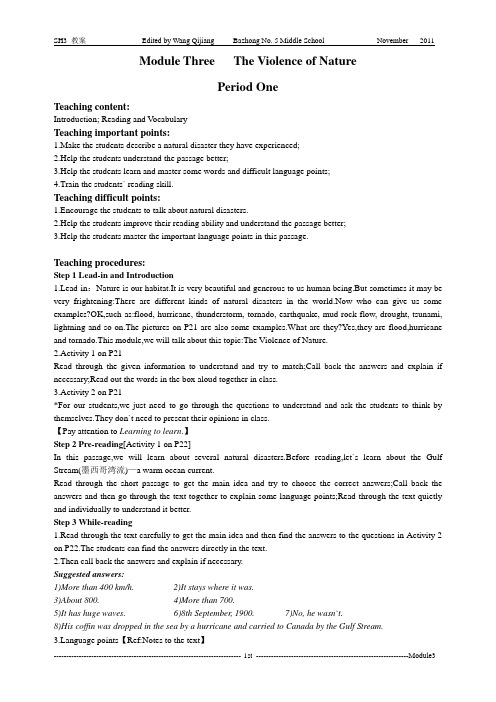
Module Three The Violence of NaturePeriod OneTeaching content:Introduction; Reading and V ocabularyTeaching important points:1.Make the students describe a natural disaster they have experienced;2.Help the students understand the passage better;3.Help the students learn and master some words and difficult language points;4.Train the students` reading skill.Teaching difficult points:1.Encourage the students to talk about natural disasters.2.Help the students improve their reading ability and understand the passage better;3.Help the students master the important language points in this passage.Teaching procedures:Step 1 Lead-in and Introduction1.Lead-in:Nature is our habitat.It is very beautiful and generous to us human being.But sometimes it may be very frightening:There are different kinds of natural disasters in the world.Now who can give us some examples?OK,such as:flood, hurricane, thunderstorm, tornado, earthquake, mud-rock flow, drought, tsunami, lightning and so on.The pictures on P21 are also some examples.What are they?Yes,they are flood,hurricane and tornado.This module,we will talk about this topic:The Violence of Nature.2.Activity 1 on P21Read through the given information to understand and try to match;Call back the answers and explain if necessary;Read out the words in the box aloud together in class.3.Activity 2 on P21*For our students,we just need to go through the questions to understand and ask the students to think by themselves.They don`t need to present their opinions in class.【Pay attention to Learning to learn.】Step 2 Pre-reading[Activity 1 on P22]In this passage,we will learn about several natural disasters.Before reading,let`s learn about the Gulf Stream(墨西哥湾流)—a warm ocean current.Read through the short passage to get the main idea and try to choose the correct answers;Call back the answers and then go through the text together to explain some language points;Read through the text quietly and individually to understand it better.Step 3 While-reading1.Read through the text carefully to get the main idea and then find the answers to the questions in Activity 2 on P22.The students can find the answers directly in the text.2.Then call back the answers and explain if necessary.Suggested answers:1)More than 400 km/h. 2)It stays where it was.3)About 800. 4)More than 700.5)It has huge waves. 6)8th September, 1900. 7)No, he wasn`t.8)His coffin was dropped in the sea by a hurricane and carried to Canada by the Gulf Stream.nguage points【Ref:Notes to the text】Go through the text together with the students to explain some language points.4.Read through the text again quietly and individually to understand it better.Time permitting,listen to the tape and follow it.Step 4 Post-reading[Activity 3 on P22]Read through the given information to understand it and try to match;Call back the answers and explain if necessary;Read out the words in the box aloud together.Step 5 Summary and Homework1.Summary: Summarize what they have learned in this period.2.Homework: Reading on P81-82 in workbook.Appendix: Notes to the text1.occur vi.▲(1)发生[=happen,take place(强调按计划)]e.g:The accident occurred at five o`clock.(=happen)▲(2)想起,想到(与to 连用)sth. occurs to sb. OR It occurs to sb. that clause(主语从句) 某人突然想起…e.g: An excellent idea occurred to me when I woke up this morning.It occurred to me that I would travel Europe.2.They can destroy houses,but leave the furniture inside exactly where it was.▲leave + O. + OC.“使…处于某状态”,宾补可以是介词短语、形容词、分词等。
外研版高中英语必修三模块3高中英语教学设计
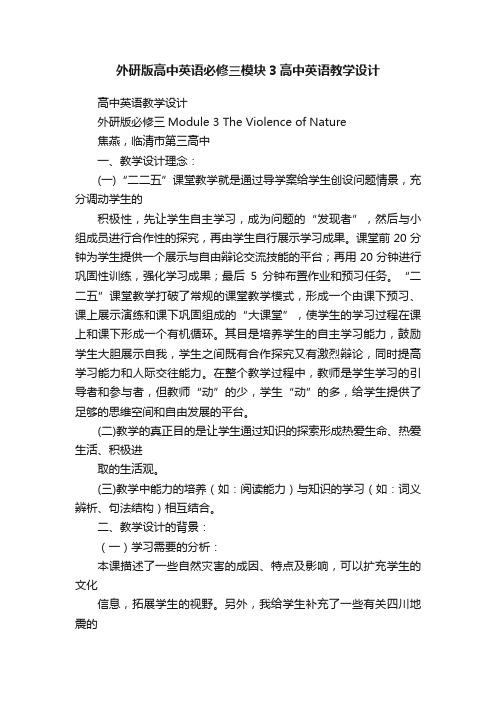
外研版高中英语必修三模块3高中英语教学设计高中英语教学设计外研版必修三Module 3 The Violence of Nature焦燕,临清市第三高中一、教学设计理念:(一)“二二五”课堂教学就是通过导学案给学生创设问题情景,充分调动学生的积极性,先让学生自主学习,成为问题的“发现者”,然后与小组成员进行合作性的探究,再由学生自行展示学习成果。
课堂前20分钟为学生提供一个展示与自由辩论交流技能的平台;再用20分钟进行巩固性训练,强化学习成果;最后5分钟布置作业和预习任务。
“二二五”课堂教学打破了常规的课堂教学模式,形成一个由课下预习、课上展示演练和课下巩固组成的“大课堂”,使学生的学习过程在课上和课下形成一个有机循环。
其目是培养学生的自主学习能力,鼓励学生大胆展示自我,学生之间既有合作探究又有激烈辩论,同时提高学习能力和人际交往能力。
在整个教学过程中,教师是学生学习的引导者和参与者,但教师“动”的少,学生“动”的多,给学生提供了足够的思维空间和自由发展的平台。
(二)教学的真正目的是让学生通过知识的探索形成热爱生命、热爱生活、积极进取的生活观。
(三)教学中能力的培养(如:阅读能力)与知识的学习(如:词义辨析、句法结构)相互结合。
二、教学设计的背景:(一)学习需要的分析:本课描述了一些自然灾害的成因、特点及影响,可以扩充学生的文化信息,拓展学生的视野。
另外,我给学生补充了一些有关四川地震的图片和英文报道,激发学生用英语获取知识和解决问题的兴趣。
(二)学习内容的分析:外研版英语教材中的每一个单元都是围绕一个独立的话题展开,包括听、说、读、写等综合技能的训练。
本单元为高一必修三第三模块,教学内容为描述自然灾害。
目的是让学生通过完成本模块的任务,能够对所学语言灵活运用,熟练掌握有关自然灾害这一话题词汇和表达句型。
并通过模块学习使学生了解地震、飓风、龙卷风等各种自然灾害的成因、过程及所造成的严重后果。
培养学生对自然科学知识的渴求,对美好生活的热爱,激发他们学好自然科学服务于生活的热情。
外研版高中英语必修三module3教案

外研版高中英语必修三module3教案高一英语第十一次课----- 必修三module3一、考点、热点回顾(一)key words and phrases1.experience vt.经历n(可数)经历n(不可数)经验2.cause vt.引起,导致cause sb. to do sth.导致某人去做某事cause sb. trouble/problems 给某人带来麻烦/问题cause n.起因,理由,事业-------指造成某事的直接原因,后常接of或to doreason n.原因,理由------指从逻辑推理上得出的原因,后常接for或定语从句。
3.bury vt.埋葬bury oneself in =be buried in 专心于,埋头于bury one’s face in one’s hands 双手捂脸4.occur vi.发生-------指发生时,有计划无计划均可。
脑海中出现某种想法。
happen vi.发生------指事先无计划偶然发生。
碰巧作某事happen to do sth.take place 发生-------指事先安排,计划的事情。
举行。
以上三词均无被动形式。
sth. Occurs sb. 某人想起=strike/hit eg: A good idea occurred to me .It occurs to sb. to do sth.某人想起It occurred to me to visit my teacher.It occurs to sb. that…某人想起It occurred to me that I should visit my teacher.5.take off 去掉,脱掉,起飞,成功,休假,减去,移动6.strike vt&n.(雷电,暴风雨等)袭击=hit,击打,碰撞,罢工,想起=occur to,打动(1)The miners went on strike for higher pay. (2)Does this clock strike twelve?(3)A good idea struck me while I was walking along the river. (4)He hit me ,so I struck him back.(5)A huge forest fire broke out after the lighting struck. (6)I am still struck by the native beauty of the lake.7.ruin vt.毁坏,破坏,使堕落n.毁灭,崩溃,废墟in ruins 变成一片废墟8.warn vt.警告,告诫,提醒注意warn sb. of/about sth.提醒某人注意某事warn sb. not to do sth.= warn sb.against doing sth. 提醒某人不要做某事give a warning 发出警告without warning 毫无预警9.in all 总共,总计above all 最重要的是after all 毕竟at all 确实,根本first of all首all of a sudden突然all in all从各方面考虑all along一直,始终10.possibility n.可能性,可能发生的事There is a/no possibility that… 有(不)可能There is a/no possibility of doing sth.有(没有)的可能possible adj.可能的It is possible (for sb.)to do sth. It is possible that…….11.set fire to =set….on fire 放火(焚烧)…….on fire着火(状态)catch fire 着火(动作)put out a fire扑灭火12.put out 扑灭(火),伸出,出版put off推迟put up张贴,建造put away放好,收好put on 穿上,上演put forward 提出1.拿起;拾起;搭载;学会;收听2.平均3.有史以来4.到……时为止5.结束;告终6.扑灭7.放火烧…… 8.总共9.带来损害10.使某人无家可归pick up on average of all time by the time end up put out set fire to in alldo/cause damage make sb. homeless选词填空in all,set fire to,by the time,pick up,on average1. __________ you arrive, I will have left.2.__________, I spend two hours doing my homework every day.3.Sorry, I have to go to _______ my son from school.4.How much money does he owe you ______?5.Have the police found out who ________ the building?(二)Language PointsOn average, there are800 trnadoes in the US each year, causing about 80 deaths and 1,500 injuries.现在分词短语作结果状语The fire burned for 3 days, destroying a total of 25,000 buildings.现在分词短语作结果状语表自然而然的结果。
外研版高中英语必修3Module3_Reading_and_Vocabulary_名师教学设计(二)
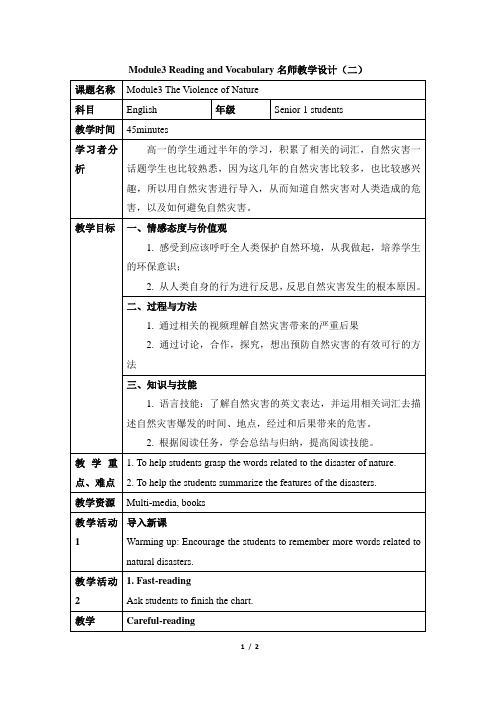
教学重点、难点
1. To help students grasp the words related to the disaster of nature.
2. To help the students summarize the features of the disasters.
教学目标
一、情感态度与价值观
1.感受到应该呼吁全人类保护自然环境,从我做起,培养学生的环保意识;
2.从人类自身的行为进行反思,反思自然灾害发生的根本原因。
二、过程与方法
1.通过相关的视频理解自然灾害带来的严重后果
2.通过讨论,合作,探究,想出预防自然灾害的有效可行的方法
三、知识与技能
1.语言技能:了解自然灾害的英文表达,并运用相关词汇去描述自然灾害爆发的时间、地点,经过和后果带来的危害。
教学
活动4
Group Work
Watch the video and summarize the tips of how to survive in the natural diaster.
教学活动5
Self-assessment
To write as many words or phrases related to the disaster of nature as possible.
教学
活动3
Careful-reading
Read the first two passages and complete the chart.
Watch the video and use the verbs to describe the destruction of tornado.
外研版高中英语必修3Module3Culturalcorner精品教案

外研版⾼中英语必修3Module3Culturalcorner精品教案Module3 Cultural corner 精品教案Teaching contents:Earthquakes Around the PacificTeaching important points:Learn something about earthquakes around the Pacific Teaching difficult points:Master the difficult language pointsTeaching methods:reading and explainingTeaching procedures:Step 1 Self-study: Finish the exercises on page 34 of 世纪⾦榜1 从⼀边到另⼀边___________2 持续两天_________3 总共__________4 丢掉性命_________5 发⽣___________6 ⾃然灾害_____________ Step 2 Read the article and answer the questions.1 Where was the worst Chinese earthquake?It was in Hua County in Shanxi Province.2 What was the most dangerous thing about the California Earthquake of 1906?The fires that started.3 Is it possible there could be another earthquake there?Yes, there is.Step 3 Find the useful words and phrases used to describe the earthquakesStep 4 Language points1 worldwide adj. found in the whole world 遍及全世界的In a word, worldwide economic trends are good.adv. all over the world 遍及世界各地,全世界Our products are sold worldwide.2 active adj. 活跃的;积极的be active in在…⽅⾯活跃/积极take an active part in 积极参与3 in all 总共,共计 e.g. There are twelve of us in all for dinner.That’s 25 pounds in all.all in all 总的说来above all ⾸先;最重要的是first of all⾸先;最先at all 竟然,终于not at all ⼀点也不;不⽤谢after all 到底;毕竟;终究;别忘了4 damage n. 损失;损害,损坏do damage to sth. 危害/损害… 对…造成损失e.g. The storm did a lot of damage to the crops.Step 5 Exercises1 We were fifteen____________.我们⼀共⼗五个⼈。
外研版高中英语必修三【教学设计】Module3
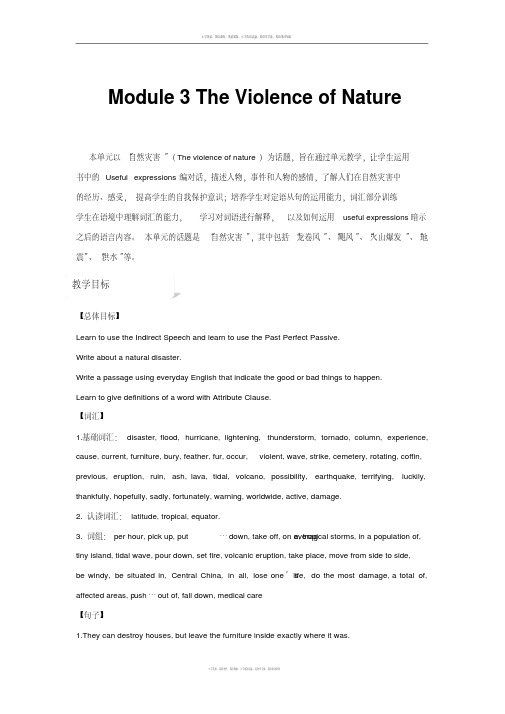
Learn to give definitions of a word with Attribute Clause. 【词汇】
1.基础词汇: disaster, flood, hurricane, lightening, thunderstorm, tornado, column, experience, cause, current, furniture, bury, feather, fur, occur, violent, wave, strike, cemetery, rotating, coffin,
Tornado
Hurricane
Definition
Place Phenomena Bad results
The
worst
example
Step 5 Post-reading Find the words and expressions in the passages and match them with their definitions.
2. 认读词汇: latitude, tropical, equator.
3. 词组: per hour, pick up, put
… down, take off, on aev, etrroapgical storms, in a population of,
tiny island, tidal wave, pour down, set fire, volcanic eruption, take place, move from side to side,
previous, eruption, ruin, ash, lava, tidal, volcano, possibility, earthquake, terrifying, luckily,
外研版高中英语必修3 Module3教学设计Teaching Resources1教案

Part Two Teaching Resources第二部分教学资源Section 1 Background readings for Module 3 The Violenceof Nature1. latitudeLatitude, angular distance of any point on the surface of the earth north or south of the equator. The equator is latitude 0°, and the North Pole and South Pole are latitudes 90°N and 90°S, respectively.2. lavaLava is molten rock that a volcano expels during an eruption. Lava, when first exuded from a volcanic vent, is a liquid at very high temperature: typically from 700°C to 1200°C (1300°F to 2200°F). Although the viscosity of lava is 100,000 times that of water, the viscous rock can flow many miles before eventually cooling and solidifying.3. Ten deadliest natural disastersSection 2 The Analysis of the Difficult Sentences fromModule 3 The Violence of Nature1.They can destroy houses, but leave the furniture inside exactly where it was. 他们能完全地破坏房子, 但是房子里面的家具却能留在原处。
Module3教学案外研版必修
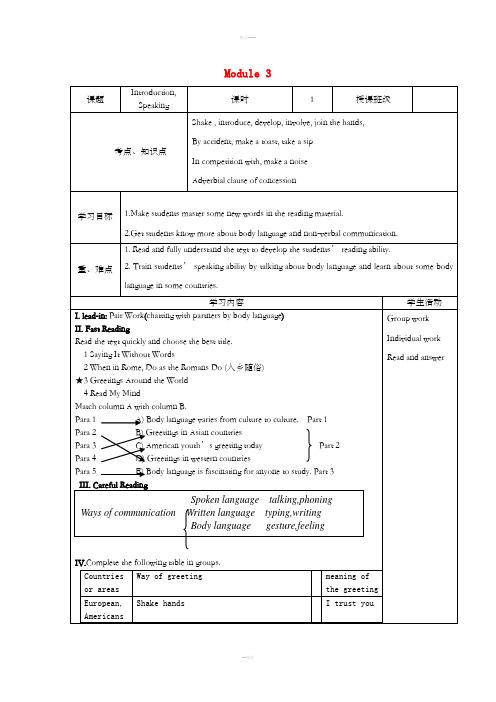
Ways of communication Written language typing,writing
Body language gesture,feeling
学生活动 Group work Individual work Read and answer
plete the following table in groups. Countries Way of greeting or areas European, Shake hands Americans
II. Fast Reading
Read the text quickly and choose the best title.
1 Saying It Without Words
2 When in Rome, Do as the Romans Do (入乡随俗)
★3 Greetings Around the World
Part 2
Para 4
D) Greetings in western countries
Para 5
E) Body language is fascinating for anyone to study. Part 3
III. Careful Reading
Read para.1 aloud together and fillSipnothkeenbllaannksguage talking,phoning
精品----
课题
Introduction, Speaking
考点、知识点
Module 3
课时
1
授课班级
Shake , introduce, develop, involve, join the hands, By accident, make a toast, take a sip In competition with, make a noise Adverbial clause of concession
英语必修ⅲ外研版module3教案3
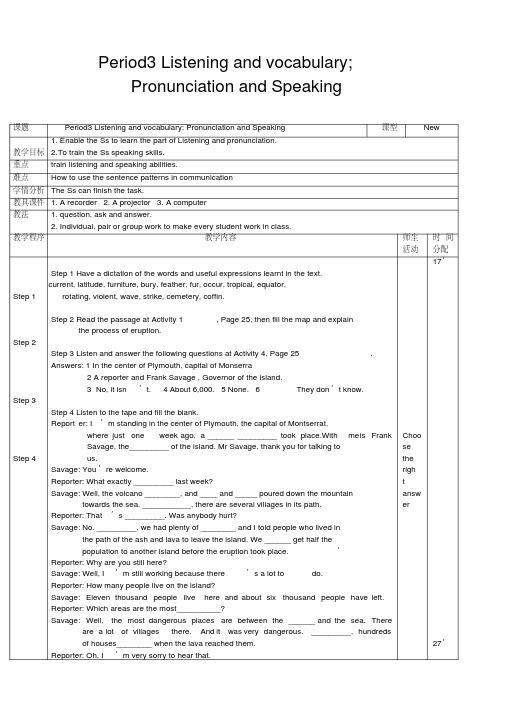
Period3 Listening and vocabulary;Pronunciation and Speaking课题Period3 Listening and vocabulary; Pronunciation and Speaking 课型New教学目标1. Enable the Ss to learn the part of Listening and pronunciation.2.To train the Ss speaking skills.重点train listening and speaking abilities.难点How to use the sentence patterns in communication学情分析The Ss can finish the task.教具课件 1. A recorder 2. A projector 3. A computer教法 1. question, ask and answer.2. Individual, pair or group work to make every student work in class.教学程序教学内容师生活动时间分配Step 1 Step 2 Step 3 Step 4 Step 1 Have a dictation of the words and useful expressions learnt in the text.current, latitude, furniture, bury, feather, fur, occur, tropical, equator,rotating, violent, wave, strike, cemetery, coffin.Step 2 Read the passage at Activity 1, Page 25, then fill the map and explain the process of eruption.Step 3 Listen and answer the following questions at Activity 4, Page 25.Answers: 1 In the center of Plymouth, capital of Monserra2 A reporter and Frank Savage , Governor of the island.3 No, it isn’t.4 About 6,000.5 None.6 They don’t know.Step 4 Listen to the tape and fill the blank.Report er: I’m standing in the center of Plymouth, the capital of Montserrat,where just one week ago, a ______ _________ took place.With me i s FrankSavage, the_________ of the island. Mr Savage, thank you for talking tous.Savage: You’re welcome.Reporter: What exactly _________ last week?Savage: Well, the volcano ________, and ____ and _____ poured down the mountain towards the sea. ___________, there are several villages in its path.Reporter: That’s _________. Was anybody hurt?Savage: No. _________, we had plenty of ________ and I told people who lived in the path of the ash and lava to leave the island. We ______ get half thepopulation to another island before the eruption took place.’ Reporter: Why are you still here?Savage: Well, I’m still working because there’s a lot to do.Reporter: How many people live on the island?Savage: Eleven thousand people live here and about six thousand people have left. Reporter: Which areas are the most__________?Savage: Well, the most dangerous places are between the ______ and the sea. There are a lot of villages there. And it was very dangerous. _________, hundreds of houses________ when the lava reached them.Reporter: Oh, I’m very sorry to hear that.Choosetherightanswer17’27’Step 5 Savage: _____________, no one was killed.Reporter: Are the houses still _____ _______?Savage: No. Fortunately, we _____ all the fires _____ quite quickly.Reporter: That’s very good news. Well, it’s a beautiful sunny day here in Plymouth.Does this mean that the danger ________?Savage: No! The volcano could erupt again! People must understand that it is still very dangerous and they can’t ________to their houses.Reporter: OK-So that’s the message from th e governor_______________. When will people be able to return home?Savage: We don’t know at the moment.____________, it won’t be too long. Reporter: Thank you for your time, Mr Savage.Savage: Thank you.Step 5 PronunciationListen and underline the words which the speaker stresses. These key words contain the main ideas.板书 Period3 Listening and vocabulary; Pronunciation and Speaking current, latitude, furniture, bury, feather, fur,occur, tropical, equator, rotating,violent, wave, strike, cemetery, coffin.教学后记So many usage for Ss.。
外研社必修3-module3教学案
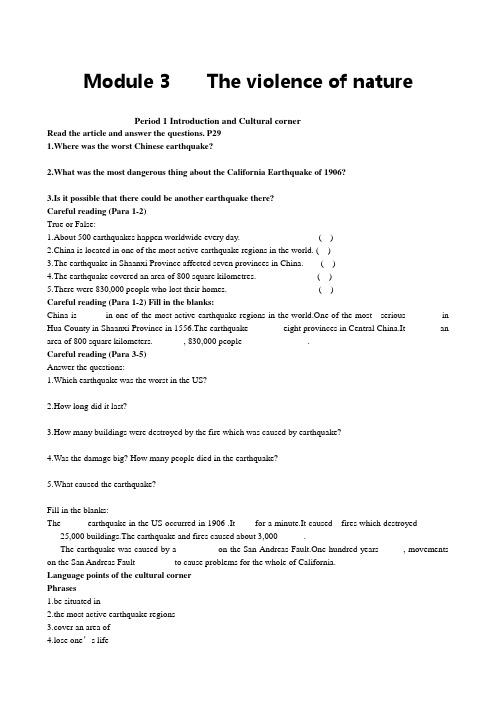
Module 3 The violence of naturePeriod 1 Introduction and Cultural cornerRead the article and answer the questions. P291.Where was the worst Chinese earthquake?2.What was the most dangerous thing about the California Earthquake of 1906?3.Is it possible that there could be another earthquake there?Careful reading (Para 1-2)True or False:1.About 500 earthquakes happen worldwide every day. ( )2.China is located in one of the most active earthquake regions in the world. ( )3.The earthquake in Shaanxi Province affected seven provinces in China. ( )4.The earthquake covered an area of 800 square kilometres. ( )5.There were 830,000 people who lost their homes. ( )Careful reading (Para 1-2) Fill in the blanks:China is______ in one of the most active earthquake regions in the world.One of the most serious _______ in Hua County in Shaanxi Province in 1556.The earthquake _______ eight provinces in Central China.It _______ an area of 800 square kilometers._______, 830,000 people _____________.Careful reading (Para 3-5)Answer the questions:1.Which earthquake was the worst in the US?2.How long did it last?3.How many buildings were destroyed by the fire which was caused by earthquake?4.Was the damage big? How many people died in the earthquake?5.What caused the earthquake?Fill in the blanks:The _____ earthquake in the US occurred in 1906 .It ____for a minute.It caused fires which destroyed __ ____ ___25,000 buildings.The earthquake and fires caused about 3,000______.The earthquake was caused by a _______ on the San Andreas Fault.One hundred years _____, movements on the San Andreas Fault ________ to cause problems for the whole of California.Language points of the cultural cornerPhrases1.be situated in2.the most active earthquake regions3.cover an area of4.lose one’s lifest for6.the worst natural disaster7.do damage8.make sb homeless9.in the whole of10.be caused bySentences1.About 400 earthquake occur worldwide every day, more than a hundred thousand in a year.(para.1)occur: vi.to happen 发生(不用于被动语态)occur---occurred---occurred---occurring他告诉我那事故是怎样发生的。
外研版高中英语必修3 Module3 Reading and vocabulary 精品教案
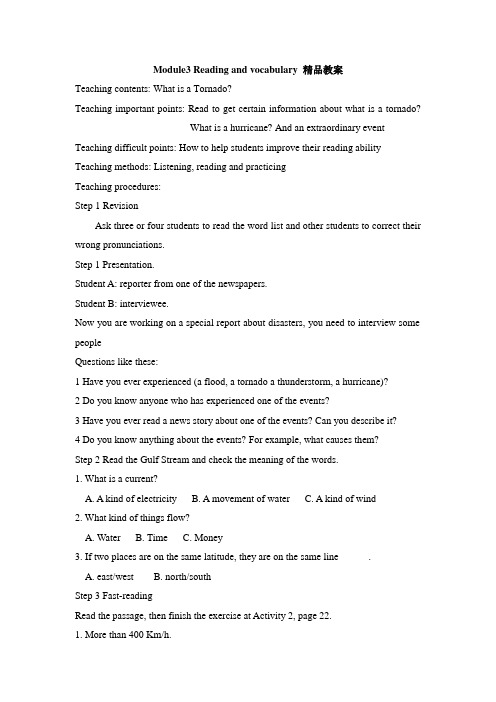
Module3 Reading and vocabulary 精品教案Teaching contents: What is a Tornado?Teaching important points: Read to get certain information about what is a tornado?What is a hurricane? And an extraordinary event Teaching difficult points: How to help students improve their reading ability Teaching methods: Listening, reading and practicingTeaching procedures:Step 1 RevisionAsk three or four students to read the word list and other students to correct their wrong pronunciations.Step 1 Presentation.Student A: reporter from one of the newspapers.Student B: interviewee.Now you are working on a special report about disasters, you need to interview some peopleQuestions like these:1 Have you ever experienced (a flood, a tornado a thunderstorm, a hurricane)?2 Do you know anyone who has experienced one of the events?3 Have you ever read a news story about one of the events? Can you describe it?4 Do you know anything about the events? For example, what causes them?Step 2 Read the Gulf Stream and check the meaning of the words.1. What is a current?A. A kind of electricityB. A movement of waterC. A kind of wind2. What kind of things flow?A. WaterB. TimeC. Money3. If two places are on the same latitude, they are on the same line______.A. east/westB. north/southStep 3 Fast-readingRead the passage, then finish the exercise at Activity 2, page 22.1. More than 400 Km/h.2. It stays where it was.3. About 800.4. More than 700.5. It has huge waves.6. 8th September, 19007. No, h e wasn’t8. His coffin was dropped in the sea by a hurricane and carried to Canada by the Gulf Stream.Step 4 Detailed-reading (True or False)1 All tornadoes have winds of more than 400 kilometres per hour.2 There are more tornadoes occurring in the US than in other parts of the world.3 Tornadoes can’t destroy furniture because they are not violent enough.4 In the US, there are usually about 80 people killed in tornadoes every year.5 The worst tornado in history killed at least 700 people6 Every year there are six Atlantic hurricanes.7 Both the worst tornado and the worst hurricane occurred in the US.8 The worst hurricane of all time killed about one-sixth of the population in the US.9 Charles Coghlan didn't become famous until he moved to New York.10 Coghlan’s coffin was destroyed by the 1900 Galveston hurricane.11 It was only because of the hurricane that Coghlan’s body could travel back to Canada.Step 5 Fill in the form.Step 6 Homework: Collect more information on Internet about one of the disasters.。
外研版必修三英语M3第三单元教案
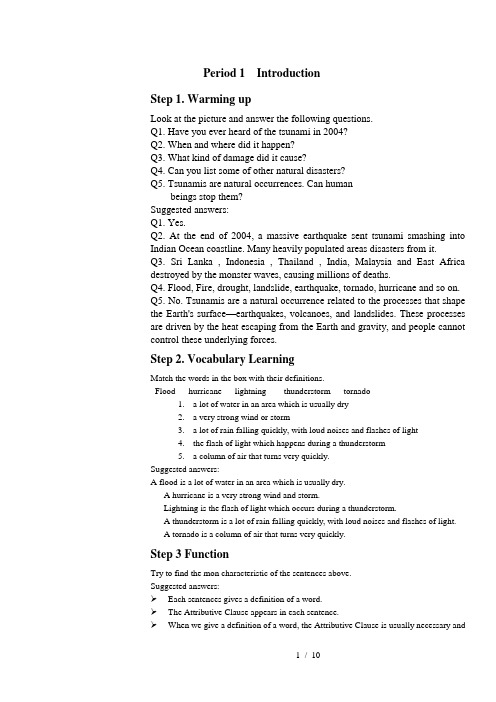
Period 1 IntroductionStep 1. Warming upLook at the picture and answer the following questions.Q1. Have you ever heard of the tsunami in 2004?Q2. When and where did it happen?Q3. What kind of damage did it cause?Q4. Can you list some of other natural disasters?Q5. Tsunamis are natural occurrences. Can humanbeings stop them?Suggested answers:Q1. Yes.Q2. At the end of 2004, a massive earthquake sent tsunami smashing into Indian Ocean coastline. Many heavily populated areas disasters from it.Q3. Sri Lanka , Indonesia , Thailand , India, Malaysia and East Africa destroyed by the monster waves, causing millions of deaths.Q4. Flood, Fire, drought, landslide, earthquake, tornado, hurricane and so on. Q5. No. Tsunamis are a natural occurrence related to the processes that shape the Earth's surface—earthquakes, volcanoes, and landslides. These processes are driven by the heat escaping from the Earth and gravity, and people cannot control these underlying forces.Step 2. Vocabulary LearningMatch the words in the box with their definitions.Flood hurricane lightning thunderstorm tornado1. a lot of water in an area which is usually dry2. a very strong wind or storm3. a lot of rain falling quickly, with loud noises and flashes of light4.the flash of light which happens during a thunderstorm5. a column of air that turns very quickly.Suggested answers:A flood is a lot of water in an area which is usually dry.A hurricane is a very strong wind and storm.Lightning is the flash of light which occurs during a thunderstorm.A thunderstorm is a lot of rain falling quickly, with loud noises and flashes of light.A tornado is a column of air that turns very quickly.Step 3 FunctionTry to find the mon characteristic of the sentences above.Suggested answers:➢Each sentences gives a definition of a word.➢The Attributive Clause appears in each sentence.➢When we give a definition of a word, the Attributive Clause is usually necessary andhopeful. We’d better learn to use the structure "A is B that/w hich"Step 4 PracticeGive definitions of the words following the pattern "A is B that/which".An earthquake a volcanic eruption a plane crashSuggested answers:1.An earthquake happens when the earth shakes because of movementunderground.2. A volcanic eruption is that lava and ash ing out of a volcano.3. A plane crash is that a plane stopping flying and crashing into the earth. Step 5 Discussions4.Which kind of these natural disasters have ever experienced? Can youdescribe it?5.Have you ever read a news story about one of the events? Can you describeit?6.Do you know anything about the events? For example, what causes them? Homework:1.Surf the Internet in order to have a better understanding of natural disasters.2.Preview the passage in Reading and Vocabulary.Blackboard design:Period 2 Reading and VocabularyStep 1. Leading-inMatch up the photos with the descriptions in Activity 1 on page 2.Step2.While ReadingI. Fast readingRead the passage quickly and answer the question:Which countries do the four cities mentioned in the passage belong to? Paris belongs to ________.Barcelona belongs to ________.Florence belongs to ________.Athens belongs to _________.II. Intensive reading1.Read the passage carefully and finish answer the questions.<1>Which of the cities are capital cities?<2>Which one is situated on the coast?<3>Which is famous for its places to eat?<4>. Which ones are or were important cities for writers and artists?<5> Which was the world’s greatest city a long time ago?2. Read the passage carefully and finish Activity4.<1>The Eiffel Tower is a tall building in France.<2>There are a lot of restaurants and cafes in Paris.<3>Barcelona is the capital of Spain.<4>The Church of the Sagrada Familia was built in 1926.<5>The artistic movement called the Renaissance began in Florence.<6>The Uffizi Palace is a famous hotel in Florence.<7>A long time ago, Athens was the world’s most powerful city.<8> There were a lot of good writers in ancient Athens.Suggested answers:TTFFTFTT3.Match the words in the box with their definitions.<1>someone who designs buildings_____________<2>to be in a certain place._____________<3>something that is easy to recognize, such as a building_____________<4>someone who produces novels or poems_____________<5>a large building where people can see famous pieces of art_____________<6>the art of making things out of stone and wood,etc_____________ancient architect gallery landmark locate sculpture writer <7>of a time long ago_____________III.Post reading-Discussion1 What did you know about these cities before you read the text?2 What new information did you learn?3 Which of them would you most like to visit?Step IV SummaryToday we have learnt.......Step V HomeworkCollect more information on Internet about one of the cities from the Great European cities.Examples:1 How many people live there?2 What kind of sports do they like?3 What’s their favorite food?4 What about the climate?5 What’re the geographical features?Period 3 Language ExplanationsStep 1[词条1]occur[课文原句]Almost all of them occur in the US, in the area from Texas in the southeast to South Dakota in the north. <Page23>[点拨]occur此处意为"发生",不与物动词,没有被动语态.如:About 400 earthquakes occur worldwide every day, and more than a hundred thousand in a year.[拓展]happen, occur, take place辨析1. happen多用于偶然事情的发生,后面可跟happen to do sth 意为"碰巧,恰巧";happen to sb意为"……发生在某人身上" .如:Do you happen to know his telephone number?If anything happens to you, tell me at once.2. occur多指意外事故、自然灾害的发生,虽也指"偶然性",但程度比happen弱.Occur 的常见搭配还有:sth occur to sb意为"突然想到……".如:The terrible traffic accident occurred on the No 318 highway in the morning.This idea suddenly occurred to me.3. take place不带有"偶然"之意,常指经过安排的事情的发生.如:The May 4th Movement took place in 1919.[词条2]cause[课文原句]There are violent winds of 120 kilometres per hour or more, which cause huge waves, heavy rain and floods. <Page 25>[点拨]cause 此处意为"导致、引起",后接名词、代词作宾语,也可接不定式作复合宾语,还可接双宾语.如:What caused his illness?The old car has caused me a lot of trouble.[拓展]1. cause 也可作名词,意为"原因,起因",后可接of 短语或不定式.如:The cause of the accident was carelessness.2. cause 和reason<1> cause强调导致某种结果的原因,即指事物发生的直接原因.如:The heavy rain was the cause of the flood.<2> reason 作名词,意为"理由,原因",着重指在逻辑推理上引出的结论的原因,其后介词多用for.如:He has no good reason for doing that.[词条3]destroy, furniture, leave[课文原句]They can destroy houses, but leave the furniture inside exactly where it was. <Page 23>[点拨1]destroy vt. 在此处意为"破坏, 毁坏".如:The building was pletely destroyed by the big fire.[拓展]destroy, injure, damagedestroy指通过某种有力的或粗暴的手段使之毁灭或无用,一般很难修复.如:All his hopes were destroyed by her letter of refusal.damage 指"损害,损失",损坏后价值或效率降低,一般是部分性的,还能修复,多用于无生命名词.如:The earthquake damaged several buildings.injure多指意外的伤害,在事故中受伤,大多造成容颜、功能的损害等.如:One of the players injured his knees and was carried off.[拓展]leave sb. to do sth. 意为"交给〔委托〕某人干某事",如:She will leave me to look after her baby.他要委托我照看她的孩子.[词条4] put up, put down[课文原句]Tornadoes can pick up cars, trains and even houses and put them down in the next street-or even in the next town. <Page 23>[点拨1]pick up 在此句中意为"卷起、掀起".如:The wind from northwest picked up dust and leaves on the ground.[拓展] pick up的常见意思还有:1. 用车去接某人.如:I’ll pick you up on the corner of the street at three o’clock.2. 偶然获得,学会〔知识、语言等〕.如:I picked up French when I lived in France.3. 振作起精神;恢复健康.如:Pick up our courage and we will succeed at last.[点拨2]put down 在此处意为"放下".如:The PLA men ordered the enemies to put down their arms.[拓展]put down还有"记下,写下"之意.如:We should listen to our teacher carefully and put down the notes well in class.[词条5][课文原句]On average, there are 800 tornadoes in the US each year, causing about 80 deaths and 1,500 injuries. <Page 23>[点拨]on average = on an / the average 此处意为"平均",是一个副词短语.如:How many classes do you have every day on average?Homework:1.Retell the extraordinary event after class.2.Finish the exercises 10-12 on pagePeriod 4 Grammar 1&2Step 1. RevisionCheck the answers to the Vocabulary Exercises in the Workbook.Step 2. Grammar 11. Ask Ss to look at the two sentences in Activity 1 and discuss which event happened first.2. Give Ss the following grammatical rules.2. Ask Ss to finish Activity 2 on Page 24 and present their answers.3. Ask Ss to finish Activity 3 on Page 24.Step 3. Grammar 21. Ask Ss to read the sentences in Activity 1 and discuss the questions.2. Ask Ss to do Activity 2 on Page 26 and present their answers.3. Give Ss the grammatical points of indirect speech.直接引语变成间接引语时,要注意以下几点:人称变化、时态变化、宾语从句要用陈述句语序.<1> 直接引语是陈述句,变成间接引语时,由连词that 引导.<2>直接引语是一般<选择/反意>疑问句,变成间接引语时,由连词whether或if 引导.注意:大多数情况下,if和whether 可以互换,但后有or not,或在动词不定式前,或放在介词后作连接词时,一般只用whether.<3> 直接引语是特殊疑问句,变成间接引语时,由相应的疑问词who, whom, whose, how, when, why, where 等引导.<4> 直接引语是祈使句,变成间接引语时,把动词原形变成动词不定式,并在动词不定前加tell, ask, order 等的宾语.<5> 一些注意事项①直接引语是客观事实、普遍真理等,变成间接引语时,时态不变.②直接引语变间接引语时, 指示代词、时间状语、地点状语等要作相应的变化.如:this/that→ these/those, now→then, today→that day, yesterday→the day before, last year→the year before, ago→before, here→there等.注意:如果转述时就在原来的地方,就在说话的当天,就不必改变指示代词、时间状语、地点状语等.Step 4. HomeworkAsk Ss to finish Grammar exercises in the Workbook.Period 5 Listening , Pronunciation, Everyday EnglishStep 1. RevisionCheck the answers to the Reading exercises in the Workbook.Step 2. Vocabulary study1.Ask Ss to read the passage on page 25 and then match the following words with their definitions.<1> ash <a> a mountain with fire and steam inside<2> erupt <b> rock in a hot liquid state<3> lava <c> a very large dangerous ocean wave<4> tidal wave <d> the soft grey powder left after sth has been burnt<5> volcano <e> to explode and pour out fireSuggested Answers:<1> d <2> e <3> b <4> c <5> a2. Ask Ss to finish Activity 3 on Page 25 learn something about volcanic eruption.3. plete the following sentences.<1> Our classroom is ________________<长10米,宽8米>.<2> The weather forecast _______<警告> a typhoon.<3> There is _____〔很大可能〕of a rain this afternoon.<4> That house ______<着火了>,it is still ____<着火>.<5> The criminal _______<把那房子点着火了>,the firemen _____<把火灭了>. Suggested Answers:<1> 10 meters long and 8 meters wide/ 10 meters in length and 8 meters in width<2> warns us of<3> great possibility<4> caught fire, on fire<5> set fire to that house/ set that house on fire, put out the fireStep 3. Listening1. Ask Ss to listen to the tape and plete the following passage.The reporter and Frank Savage, the <1> of the island Montserrat, are standing in the <2> of Plymouth, they were talking about the <3> a week ago. The volcano <4>, and ash and <5> poured down the mountain towards the sea. <6> , the people there got plenty of <7> , so <8> of the population managed to go to another island before the eruption, that is, about <9> thousand people out of <10> had left.<11>, hundreds of houses <12> when the lava reached them. <13> , the fire was <14> quite quickly. But the volcano could erupt again, so the <15> from the governor is that the people should not go back to their houses. <16> , it won’t be long. Suggested Answers:<1> governor <2> center <3> volcanic eruption <4> erupted <5> lava<6> Luckily <7> warning <8> half <9> six <10> eleven thousand<11> Sadly <12> caught fire <13> Fortunately <14> put out<15> message <16> Hopefully2. Ask Ss to listen again and finish Activity 4 on Page 25.Step 4. Pronunciation1. Get Ss to listen and underline the words which the speaker stresses.2. Get Ss to read the passage aloud and pay attention to the stress of key words.3. Explain to Ss which words should be stressed when pronounce a sentence.一般来说, 句子重音通常要体现句子的节奏感和韵律,突出重点.在句子中需重读的词都是实词,比如,名词、动词、形容词、副词、数词、代词等.不重读的多为虚词,比如,冠词、连词、介词、感叹词等.但有时虚词也需要重读,主要有以下几种情况:<1> 强调或突出某个虚词或be动词时要重读;<2> 介词在句首时往往要重读;<3> be动词与助动词和not结合时要重读;<4> 句子末尾的be动词和助动词一般要重读Step 5. Everyday English1. Let Ss read the words and discuss which of the words given indicate that the following sentences contain good news or bad news.2. Let Ss finish Activity 2 on Page 28.Step 6. HomeworkAsk Ss to finish the exercises in Vocabulary part in the WorkbookBlackboard design:Period 6 Speaking, Writing, Module FileStep 1. RevisionCheck the Grammar exercises in the Workbook.Step 2. Speaking1. Divide Ss in groups of four and discuss the following points.<1> Decide what kind of natural disaster they will discuss.<2> As a reporter, make a list of questions about a natural disaster.<3> As local residents, think of things that happened to them or what they saw and how to present them to the journalist.2. Ask Ss to R practise their interviews and then act them out for the rest of the class. Step3. Writing1. Let Ss read the eye-witness account of a violent natural event on page 28.2. Ask Ss to write about the violent natural event they have just talked about.One possible version:The weather forecast says we will have a very strong typhoon today, but we didn’t expect it would be so strong. Sitting in the classroom, we can hear strong wind blowing outside, making the strong tall trees in the schoolyard waving from side to side---some have leapt against the walls, some have even fallen to the ground, with their roots pulled out of the earth. Heavy rain is beating against the windows, producing loud noise. It seems there is a big rain screen hanging from the heaven, and streams of rain water gather quickly down to lower places. Everyone is looking outside excitedly, even the teacher also joins us.Step 4. Module FileAsk Ss to look at Module File on page 20 and try to recall what they have learnt in the module. Then tick the things they are sure that they know and put a question mark next to the points they are not sure of and a cross to what they don’t know. Help Ss to share their ideas and deal with the difficult or confusing points.Ask Ss to read some articles or novels about natural disasters to strengthen their reading skills and enlarge their vocabulary.Step 5. Homework1. Ask Ss to go over what they learned in Module 3.2. Ask Ss to preview Module 4。
- 1、下载文档前请自行甄别文档内容的完整性,平台不提供额外的编辑、内容补充、找答案等附加服务。
- 2、"仅部分预览"的文档,不可在线预览部分如存在完整性等问题,可反馈申请退款(可完整预览的文档不适用该条件!)。
- 3、如文档侵犯您的权益,请联系客服反馈,我们会尽快为您处理(人工客服工作时间:9:00-18:30)。
高一英语第十一次课----- 必修三module3一、考点、热点回顾(一)key words and phrases1.experience vt.经历n(可数)经历n(不可数)经验2.cause vt.引起,导致cause sb. to do sth.导致某人去做某事cause sb. trouble/problems 给某人带来麻烦/问题cause n.起因,理由,事业-------指造成某事的直接原因,后常接of或to doreason n.原因,理由------指从逻辑推理上得出的原因,后常接for或定语从句。
3.bury vt.埋葬bury oneself in =be buried in 专心于,埋头于bury one’s face in one’s hands 双手捂脸4.occur vi.发生-------指发生时,有计划无计划均可。
脑海中出现某种想法。
happen vi.发生------指事先无计划偶然发生。
碰巧作某事happen to do sth.take place 发生-------指事先安排,计划的事情。
举行。
以上三词均无被动形式。
sth. Occurs sb. 某人想起=strike/hit eg: A good idea occurred to me .It occurs to sb. to do sth.某人想起It occurred to me to visit my teacher.It occurs to sb. that…某人想起It occurred to me that I should visit my teacher.5.take off 去掉,脱掉,起飞,成功,休假,减去,移动6.strike vt&n.(雷电,暴风雨等)袭击=hit,击打,碰撞,罢工,想起=occur to,打动(1)The miners went on strike for higher pay. (2)Does this clock strike twelve?(3)A good idea struck me while I was walking along the river. (4)He hit me ,so I struck him back.(5)A huge forest fire broke out after the lighting struck. (6)I am still struck by the native beauty of the lake.7.ruin vt.毁坏,破坏,使堕落n.毁灭,崩溃,废墟in ruins 变成一片废墟8.warn vt.警告,告诫,提醒注意warn sb. of/about sth.提醒某人注意某事warn sb. not to do sth.= warn sb.against doing sth. 提醒某人不要做某事give a warning 发出警告without warning 毫无预警9.in all 总共,总计above all 最重要的是after all 毕竟at all 确实,根本first of all首all of a sudden突然all in all从各方面考虑all along一直,始终10.possibility n.可能性,可能发生的事There is a/no possibility that… 有(不)可能There is a/no possibility of doing sth.有(没有)的可能possible adj.可能的It is possible (for sb.)to do sth. It is possible that…….11.set fire to =set….on fire 放火(焚烧)…….on fire着火(状态)catch fire 着火(动作)put out a fire扑灭火12.put out 扑灭(火),伸出,出版put off推迟put up张贴,建造put away放好,收好put on 穿上,上演put forward 提出1.拿起;拾起;搭载;学会;收听2.平均3.有史以来4.到……时为止5.结束;告终6.扑灭7.放火烧…… 8.总共9.带来损害10.使某人无家可归pick up on average of all time by the time end up put out set fire to in alldo/cause damage make sb. homeless选词填空in all,set fire to,by the time,pick up,on average1. __________ you arrive, I will have left.2.__________, I spend two hours doing my homework every day.3.Sorry, I have to go to _______ my son from school.4.How much money does he owe you ______?5.Have the police found out who ________ the building?(二)Language PointsOn average, there are800 trnadoes in the US each year, causing about 80 deaths and 1,500 injuries.现在分词短语作结果状语The fire burned for 3 days, destroying a total of 25,000 buildings.现在分词短语作结果状语表自然而然的结果。
不定式短语作结果状语表意象不到的结果。
常用only/just+todoHe hurried to the station, only to find the train had left.Grammar过去完成时的被动语态1. The boy _ __ streets without pay in the old days.A. was made to cleanB. made cleanC. made to cleanD. was made clean2. These children ___ _ dance.A. were seen toB. were seen forC. were seenD. saw to3.The monkey was seen ____ _ off the tree.A. jumpB. jumpsC. jumpedD. to jump4.An accident __ __ on this road last week.A. has been happenedB. was happenedC. is happenedD. happened5. The apple _ __ very sweet.A. is tastedB. tasteC. tastesD. are tasting6. You _ more beautiful in the light blue shirt.A. seeB. watchC. lookD. look at7. Old people must be looked after well and _ __ politely.A. speak toB. spokenC. speakD. spoken to8. Old people must _ __.A. look after wellB. be looked well afterC. looked well afterD. be looked after well9. Newly-born babies _ _ in hospital.A. are taken good careB. are taken good care ofC. take good care ofD. take good care10. —How clean the window is!—Yes. It just now.A. has been cleanedB. was cleanedC. is cleanedD. will be cleaned间接引语直接引语与间接引语的转换1.The hotel manager said to me , “You have to stay in the hotel because this is the start of a hurricane.”The hotel manager said to me ____________________________________________.2.He said , “ I saw the roof of the house across the road disappear a moment ago.”He said ______________________________________________________________.3.A scie ntist said, “ Volcanic eruptions don’t happened very often on this island.A scientist said ________________________________________________________.4.The journalist said, “ The residents will travel back to the island when the danger is over.The journalist said _____________________________________________________.5.He said, “ Half the residents left the island last week.”He said _____________________________________________________________.6.He asked, “Does this mean that the danger is over?”He asked ____________________________________________________________?7.He asked her, “May I go there now?”He asked _____________________________________________________________?8.He asked me, “What were you doing when the earthquake happened?”He asked me _________________________________________________________?9.He asked the governor, “Can we go back to our homes tomorrow?”He asked the governor __________________________________________________?10.The tourist asked the local people, “ Had the fi re been put out before firefighter arrived?The tourist asked the local people _________________________________________?11.I said to him,“Do it at once.” I______(said)(told)him to do it at once.12.He said to me,“Shut the window,please.” He asked m e______(shut)(to shut)the window.13.I said to him,“Don’t cry!” I told him______(to not cry)(not to cry)(cry not).14.The doctor said to me,“Don’t smoke.” The doctor told/advised me______(not to smoke)(not smoke)(did not smoke).15.I said to him yesterday,“Please come early tomorrow morning.”Yesterday I______(told)(asked)(said)him to come early______(the next)(this)(that)morning.二、典型例题(一)单项选择1.[2010·天津卷] It rained heavily in the south,________ serious flooding in several provinces.A. causedB. having causedC. causingD. to cause【解析】C现在分词作状语,起补充说明的作用。
